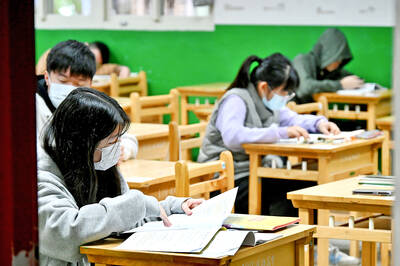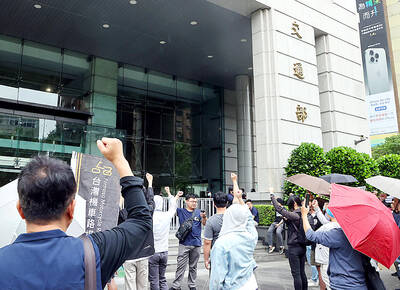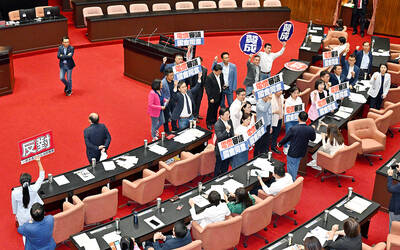Two amendments to Article 25 of the University Act (大學法), which list immigrant spouses as “special students” and provide more diverse ways for them to pursue an education, were reviewed by the legislature’s Education and Culture Committee in Taipei on Wednesday.
The amendments — proposed by Democratic Progressive Party legislators Lee Li-feng (李麗芬) and Hsu Chih-chien (許智傑) — would allow immigrant spouses to pursue further education at Taiwanese universities based on their education in their own nations.
As of October last year, the number of immigrant spouses exceeded 540,000, making them the fifth-largest population group in the nation, the ministry said.
Due attention should be given to their cultural identification, employment, parenting and whether they have adapted to the lifestyle, it said.
During the naturalization period of about four to eight years, immigrant spouses would be able to apply to study at Taiwanese universities using their high-school diploma and grades, the ministry said, adding that once the spouse is naturalized, they become subject to the rules for Taiwanese.
Because of this identity change, the spouse would have to obtain certificates signifying that they hold the equivalent education level as a Taiwanese student before they could apply for a place at university, the ministry said, adding that it is coordinating with the National Immigration Agency on the amendments.
Should the amendments pass, education in their native country would be recognized after naturalization, it said.
Naturalized spouses would also be eligible to take the civil servant examinations, or become public-school teachers, elevating their social status, it added.
Naturalized spouses would be considered “special students,” like the children of civil servants serving abroad, or the children of overseas compatriots studying in Taiwan, the ministry said.
Meanwhile, a motion to include Chinese spouses was denied, as it would involve an amendment to the Act Governing Relations Between the People of the Taiwan Area and the Mainland Area (台灣地區與大陸地區人民關係條例) that has not been debated.

POLAM KOPITIAM CASE: Of the two people still in hospital, one has undergone a liver transplant and is improving, while the other is being evaluated for a liver transplant A fourth person has died from bongkrek acid poisoning linked to the Polam Kopitiam (寶林茶室) restaurant in Taipei’s Far Eastern Sogo Xinyi A13 Department Store, the Ministry of Health and Welfare said yesterday, as two other people remain seriously ill in hospital. The first death was reported on March 24. The man had been 39 years old and had eaten at the restaurant on March 22. As more cases of suspected food poisoning involving people who had eaten at the restaurant were reported by hospitals on March 26, the ministry and the Taipei Department of Health launched an investigation. The Food and

CHANGES: After-school tutoring periods, extracurricular activities during vacations or after-school study periods must not be used to teach new material, the ministry said The Ministry of Education yesterday announced new rules that would ban giving tests to most elementary and junior-high school students during morning study and afternoon rest periods. The amendments to regulations governing public education at elementary schools and junior high schools are to be implemented on Aug. 1. The revised rules stipulate that schools are forbidden to use after-school tutoring periods, extracurricular activities during summer or winter vacation or after-school study periods to teach new course material. In addition, schools would be prohibited from giving tests or exams to students in grades one to eight during morning study and afternoon break periods, the

Advocates of the rights of motorcycle and scooter riders yesterday protested in front of the Ministry of Transportation and Communications in Taipei, making three demands. They were joined by 30 passenger vehicles, which surrounded the ministry to make three demands related to traffic regulations — that motorcycles and scooters above 250cc be allowed on highways, that all motorcycles and scooters be allowed on inside lanes, and that driver and rider training programs be reformed. The ministry said that it has no plans to allow motorcycles on national highways for the time being, and said that motorcycles would be allowed on the inner

AMENDMENT: Contact with certain individuals in China, Hong Kong and Macau must be reported, and failure to comply could result in a prison sentence, the proposal stated The Chinese Nationalist Party (KMT) and the Taiwan People’s Party (TPP) yesterday voted against a proposed bill by Democratic Progressive Party (DPP) lawmakers that would require elected officials to seek approval before visiting China. DPP Legislator Puma Shen’s (沈伯洋) proposed amendments to the Act Governing Relations Between the People of the Taiwan Area and the Mainland Area (臺灣地區與大陸地區人民關係條例), stipulate that contact with certain individuals in China, Hong Kong and Macau should be reported, while failure to comply would be punishable by prison sentences of up to three years, alongside a fine of NT$10 million (US$309,041). Fifty-six voted with the TPP in opposition